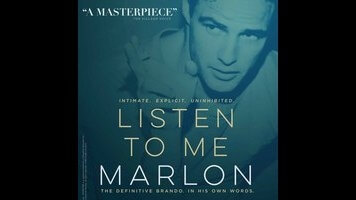Documentaries that avoid the standard talking-heads approach are always welcome, even if they sometimes turn out to be less innovative than they initially appear. Listen To Me Marlon, a sort of biographical collage, opens with these tantalizing words: “Throughout his lifetime, Marlon Brando made hundreds of hours of private audio recordings, none of which have been heard by the public until now.” Will we get to hear intimate and revelatory secrets about perhaps the most lionized film actor of all time, direct from the man’s own lips? Before you get too excited, know that Brando’s estate approved the film’s use of his cassettes, home movies, photographs, and all other memorabilia, and seems to have walked a very careful line between acknowledging his eccentricity and protecting his image. The result is certainly of interest to fans—especially those unfamiliar with the basics—but it’s not radically different from a portrait that could have been made without the tapes, using just what’s available in the public record.
Actually, there’s quite a bit of public-record material in Listen To Me Marlon, if only because director Stevan Riley isn’t making an avant-garde movie and needs to provide something in the way of visuals. Film clips are used either to directly complement what Brando is saying (when he discusses his work) or as ironic counterpoint, with a predictable emphasis on the major titles: A Streetcar Named Desire, On The Waterfront, The Godfather, Last Tango In Paris. There’s also plentiful TV-interview footage, including some that reveals Brando’s penchant for hitting on female journalists. Riley sticks to a roughly chronological structure, touching briefly on the actor’s childhood and parents before moving on to his career, his romances, his political views (including sending Sacheen Littlefeather to refuse his Oscar for playing Vito Corleone), and the tragedies involving his son, Christian, and his daughter, Cheyenne. Most of the time, Brando is clearly speaking on the record, answering someone’s questions. If the raw audio from any celebrity’s in-depth Playboy interview were illustrated with still photos, home-movie footage, and talk-show appearances, it would look more or less like this movie.
Still, that would be fairly enticing in many cases, including Brando’s. Listen To Me Marlon suffers from an atrocious score that frequently sounds like it belongs in a useless Oscar montage, and it doesn’t reveal much about Brando that cinephiles don’t already know. But the man himself is endlessly fascinating, so it’s hard to fault a movie that ditches anything extraneous (especially talking-head testimonials) in order to let him tell his own story in his own words. Despite his on-screen reputation as a Method mumbler, he was an articulate interview subject; at one point in the film, he describes his professional goal thusly: “You want to stop that movement from the popcorn to the mouth. Get people to stop chewing. The truth will do that.” And while there’s nothing terribly juicy on the audio cassettes—or at least the excerpts that were permitted to be used—there’s something deeply poignant about hearing older Brando’s attempts at self-hypnosis, which he employed in an effort to lose weight. “Just think of all the good things that you like,” Brando tells himself. “Like apple pie, and ice cream, and brownies in milk. But.” And he pauses for a moment, just as he might when delivering a scripted line. “You must not eat them quite so often.”








































